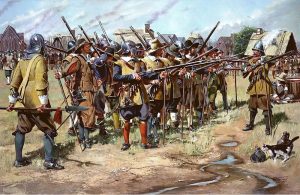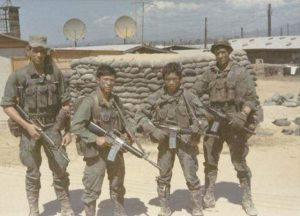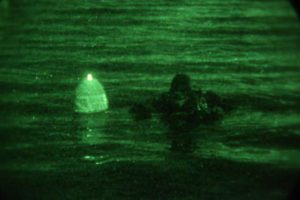
With all of the wild and crazy war and near-war news flying from all quarters in the last weeks of 2023, it’s hard to keep up…frustrating, in fact. So, this week, we will look at a historical “What if?” that might be real:
What if a uniquely American intelligence agency exists – an intelligence agency that has no public name, no financing from public funds, and does not report to Congress? An intelligence agency that has existed since the beginning of the United States as an independent nation, which has directly impacted the policies of the United States government?
Now, that sounds like a really cool idea for a modern spy thriller…but such a thing isn’t really possible, right?
Part 1 – A Hell of a Thing
Nations and nation-states need a wide variety of things in order to function; a lot of things. But one thing a state has always needed, down through history, is an intelligence service of some kind. A state planning on existing for any length of time has an absolute need to find out what the group in the next valley, or on the other side of the river are up to, lest they get paid an unexpected visit from said group[s]. It doesn’t matter whether said agency is an old police officer that is a crony of the local dictator, managing the Secret Police, or an agency with global reach, like the American Central Intelligence Agency – a state will deploy spies to at least try to stay ahead of the state’s enemies, real or imagined.
To paraphrase the words of others, I’m not saying it’s right, I’m just saying that’s the way things are.
At the same time, such agencies – regardless of time and technology – need resources beyond mere creativity in its personnel. Spy services need money – or the equivalent in disposable goods – in vast amounts. Over the last one thousand or so years, that usually means cash, initially in the form of gold and silver coins. The United States was no different when it gained its independence from Great Britain.
However, the government of the nascent United States had a fundamental problem: it had no money for something as expensive as a spy agency. Certainly, the rebel colonies used spies all through the Revolution, with some of them becoming very good, indeed. But, after the adoption of the current Constitution in 1789, the United States government could barely bring in enough money to keep it running, much less maintain a spy service. Because the only times the government could really borrow money was during wartime, the government was publicly forced to hire private detective agencies to perform basic intelligence and Executive protection duties, until the founding of the US Secret Service in 1865, following the assassination of President Lincoln. In fact, in the 30 years after 1870, there were years where the US government was unable to pay Army regiments deployed against Native American tribes west of the Mississippi River. This situation would not really change until the Federal Reserve Act of 1913 made large-scale government borrowing during peacetime possible.
But these facts did not remove the need for a foreign intelligence service. So – how did the United States survive against foreign threats without the funds to run a spy agency?
The answer, simply put is – it didn’t.
Part 2 – Wine Glass Diplomacy and the Black Hole Method
I want to be crystal clear about what follows: I have no “smoking gun” documents, and no “whistleblower” testimony. What follows is an exercise in critical thinking and deductive reasoning.
Also, because it needs to be said here in the 21st Century, I am in good health and am not depressed in any way.
There is a form of investigation known as the “Black Hole Method.” When you suspect that a thing is going on, but has been effectively concealed, how do you puzzle out what is going on? When looking for a black hole in space, one doesn’t look for the black hole itself, because it is indistinguishable from empty space, since not even light can escape from a black hole. Instead, one looks for the effects of the black hole on surrounding space.
When George Washington, the first President of the United States after the adoption of the Constitution, needed a spy agency, there was one person he would have fully trusted to create it: Benjamin Tallmadge. Tallmadge, who had started the Revolution as an officer in the Continental Army’s 2nd Continental Light Dragoons, had functioned as Washington’s main spymaster (as spy chiefs were referred to in those days), running the Culper Spy Ring operating against the British High Command in occupied New York City.

After the war, Tallmadge settled in Lichfield, Connecticut, and was appointed as the local postmaster (which was a far more prominent position, then) in 1792, and established himself in an importing business. He would later resign that post in 1801, to become a Representative in Connecticut’s “at-large” Congressional district. While serving in Congress, he would become the first President of the Phoenix Branch Bank, a position he held from 1814 to 1826.
While there is no evidence that the following speculation on events actually happened, given the nature of how things were done at the time, the United States’ government’s spy problem may well have been solved.
Sometime after Washington’s election as President (possibly very shortly after), Washington could have summoned Tallmadge to the temporary US capital in New York City, in a highly unofficial capacity. Over a quiet and private dinner, possibly attended by Secretary of State Thomas Jefferson and Secretary of War Henry Knox (both of whom were well-verse in spying), and possibly Vice President John Adams, Tallmadge would have been sounded out for recommendations on how to solve the spy problem.
Tallmadge, knowing full well of the contributions by wealthy businessmen such as Robert Morris, among several others, could have proposed an idea to have those men fund a spy agency, one which would be able to use US diplomatic and military resources when necessary. In trade, the businessmen who signed on to such a scheme would receive the intelligence collected and sent back to the government as soon as it could be copied; the information, obviously, would not be passed on to any other businessmen.

If such a scheme were set up – a scheme that was created with neither public funds nor the knowledge of Congress – every person taking part would have had a vested interest in keeping such a thing quiet, because of the clear level of corruption and nepotism involved.
An important factor would have been that such an agency was not necessarily aimed at internal surveillance, within the United States; that really would not have offered much to the financiers, and would have easily led to infighting, and the exposure of the scheme, which would seriously damage American businesses overseas.
Assuming that something like this occurred, what would the effects have been, and can we find potential evidence of such?
Part 3 – Ghosts In The Machine
Aside from some notably high-quality research, very little “official” information has come to light…suspiciously little, in fact. However, there are hints at operations of such an agency. As record keeping became more efficient of the years, cracks in security appeared – and perhaps the most important crack was named William Donovan.
While not well known today, Major General William J. Donovan, born in Buffalo, NY in 1883, and eventually attended Columbia Law University, where he was classmate of future President Franklin D. Roosevelt. He would marry Ruth Rumsey (1891-1977) in 1914. By 1916, Donovan was an officer in a New York troop of cavalry, serving in the Pancho Villa Expedition in Mexico. But in World War 1, Donovan stood out as the commander of the legendary “Fighting 69th” Infantry, during which he would be awarded with the Medal of Honor…all of which are easily sourced data points.

However, an odd passage appears in Donovan’s autobiography, referring to him “abandoning” his wife in Asia, to ‘run off Siberia to play spy’ (pgs. 32-34), in the immediate aftermath of World War 1. Now, Russian Siberia at this time was a wild and brutal battlefield, one where people were frequently rounded up and executed on a whim by all of the warring factions. James Bond aside, no one “plays” at being a spy in the real world, at least not for very long. This begs the question: Why would this sort of information be revealed? Even long after Donovan’s death in 1959, this is not information that would be advisable to release to the public. The answer seems to lie in Donovan’s wife, Ruth. A member of New York high society, she was very unhappy at his intelligence work. It could have been feared that she might reveal Donovan’s intelligence work in a fit of pique, and “removing the problem” would have been very problematic…
…But, ‘problematic’ for whom?
Donovan would go on to head up the Office of Strategic Services (OSS) for his college classmate, the now-President Roosevelt, during World War 2, quickly building a large, capable and world-spanning intelligence agency. That, in and of itself, is a questionable situation: assistance from the British Special Operations Executive (SOE) aside, there are serious holes in this story, even allowing for wartime secrecy.
On the other hand, a hidden group – one that had spent well over a century, at that point, running operations – would certainly explain how a brand new secret intelligence branch could suddenly “spin up.”
Part 4 – Today
So, where does this leave us, in the 21st Century?
There has been a series of seemingly bizarre situations in the last few years that indicate that either the US intelligence community is flat-out lying to Congress, or that they simply do not have the answers that they should.
Among these are the recent hearings on the so-called “UFO/UAP” question, something the Freedomist has covered in the past. It is entirely possible that the reason behind Congress being unable to ‘shake loose’ any meaningful information from either the armed forces or the various intelligence agencies is simply because they do not possess the information…because another group, a group that Congress has no means of contacting, much less subpoenaing, is dealing with the subject, and has no interest in informing Congress or the American People of what is going on…
…But that is something for a whole other article.








